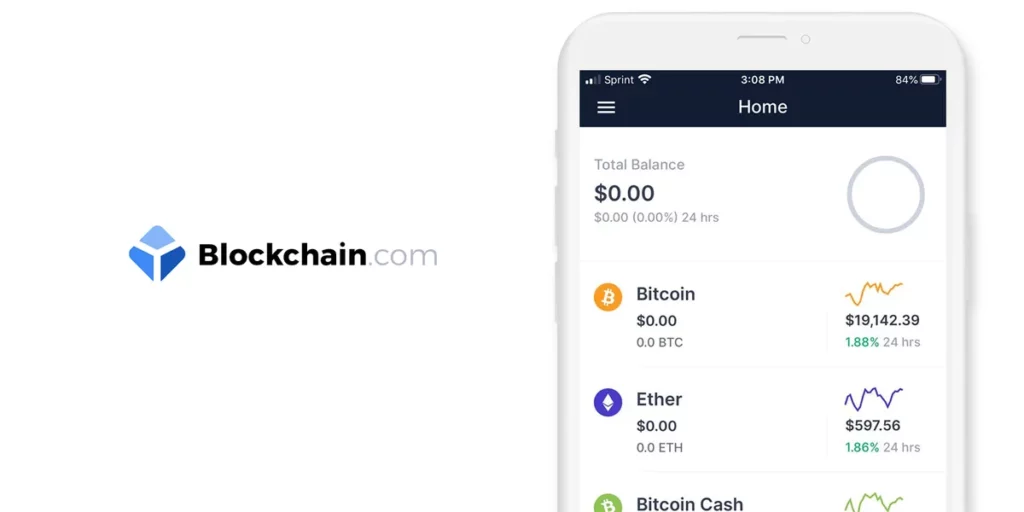- How to Buy Bitcoins on Blockchain
- How to Send Bitcoins on Blockchain
- How to Transfer Bitcoins to Blockchain Wallet
- The Role of Blockchain in Bitcoin Transactions
- Why Blockchain is Essential for Bitcoin
- Beyond Bitcoin: Blockchain’s Broader Impact
- The Role of Bitcoin’s Blockchain in the Global Economy
- Frequently Asked Questions (FAQs)
How to Buy Bitcoins on Blockchain

Buying bitcoins through blockchain platforms is straightforward and secure. Blockchain wallets, such as Blockchain.com, provide an intuitive interface for purchasing Bitcoin using various payment methods.
Steps to Buy Bitcoins on Blockchain:
- Create a Wallet:
- Sign up for a blockchain wallet and verify your identity.
- Enable security features like two-factor authentication (2FA) for enhanced protection.
- Add Funds:
- Deposit money using credit/debit cards, bank transfers, or supported e-wallets.
- Ensure your local currency is supported on the platform.
- Access the “Buy Bitcoin” Option:
- Navigate to the “Buy/Sell” section in your blockchain wallet.
- Choose the amount of Bitcoin you wish to purchase.
- Confirm the Transaction:
- Review the current exchange rate and fees.
- Complete the transaction, and the purchased Bitcoin will appear in your wallet.
Blockchain wallets make the process user-friendly, allowing even first-time users to buy Bitcoin efficiently.
How to Send Bitcoins on Blockchain
Sending Bitcoin through the blockchain is a secure way to transfer funds globally. Transactions are peer-to-peer, ensuring that your funds are delivered directly to the recipient without intermediaries.
Steps to Send Bitcoins on Blockchain:
- Log in to Your Wallet:
- Access your blockchain wallet using your credentials.
- Select the “Send” Option:
- Navigate to the “Send” section in your wallet.
- Enter the Recipient’s Address:
- Input the public wallet address of the recipient. Double-check the address to avoid errors.
- Specify the Amount:
- Enter the amount of Bitcoin you wish to send.
- Confirm and Verify:
- Review the transaction details, including fees and exchange rates.
- Authorize the transaction using your private key or 2FA.
- Transaction Completion:
- The Bitcoin will be transferred, and you can track the transaction status through the blockchain explorer.
Sending Bitcoin is fast, transparent, and perfect for cross-border transfers without the delays of traditional banking.
How to Transfer Bitcoins to Blockchain Wallet

Transferring Bitcoin from another wallet or exchange to your blockchain wallet is essential for consolidating your assets.
Steps to Transfer Bitcoins:
- Access Your Blockchain Wallet:
- Log in and navigate to the “Receive” section.
- Copy Your Wallet Address:
- Find your public Bitcoin wallet address and copy it.
- Initiate Transfer from Another Wallet:
- Go to the sending platform or wallet.
- Paste your blockchain wallet address as the recipient.
- Confirm the Transfer:
- Verify the amount, fees, and recipient address.
- Approve the transaction.
- Track the Transaction:
- Use the blockchain explorer to monitor the transfer status until the Bitcoin arrives in your wallet.
The Role of Blockchain in Bitcoin Transactions
Blockchain technology is the lifeline of Bitcoin, ensuring its functionality as a decentralized digital currency. Unlike traditional financial systems controlled by banks or governments, Bitcoin transactions rely on blockchain’s distributed ledger. This design eliminates intermediaries, making transactions faster, more secure, and cost-effective.
Key Features of Blockchain in Bitcoin Transactions
- Security Through Cryptography:
Blockchain uses cryptographic algorithms to secure Bitcoin transactions. Each transaction is verified through complex mathematical computations, ensuring authenticity and preventing tampering. Cryptographic hashes protect transaction data, making unauthorized changes virtually impossible. - Transparency and Trust:
Every Bitcoin transaction is recorded on the blockchain and can be viewed by anyone through blockchain explorers. This transparency builds trust, as all users can verify transactions without needing a centralized authority. - Immutability of Records:
Blockchain’s immutability ensures that once a transaction is added to the ledger, it cannot be altered or deleted. This feature provides a permanent and tamper-proof record of all Bitcoin transactions, reducing fraud and enhancing accountability. - Decentralized Control:
The Bitcoin blockchain operates across a global network of nodes, with no single entity in control. This decentralization makes the system resilient to attacks, censorship, and manipulation. Even if some nodes fail, the network continues to function without interruption. - Efficiency in Transactions:
Blockchain eliminates the need for intermediaries, enabling peer-to-peer transfers. This significantly reduces transaction costs and processing times, especially for international payments, which traditionally involve multiple parties and high fees. - Resilience and Reliability:
Blockchain’s decentralized structure makes it highly resilient. The network continues to operate even if parts of it are compromised. This reliability ensures that Bitcoin transactions are consistently processed and recorded.
Why Blockchain is Essential for Bitcoin

Blockchain is not just a technology but the foundation that empowers Bitcoin as a revolutionary financial instrument. It transforms Bitcoin from a simple digital currency into a trustless, borderless, and transparent system that challenges traditional financial paradigms.
How Blockchain Benefits Bitcoin
- Enabling Decentralization:
Blockchain ensures that Bitcoin operates independently of governments, central banks, or corporations. This decentralization protects users from inflation, censorship, and monetary manipulation, giving them complete control over their assets. - Guaranteeing Transparency:
Every Bitcoin transaction is publicly recorded on the blockchain. This transparency reduces the risk of fraud and corruption, fostering trust among users and making Bitcoin a viable alternative to traditional currencies. - Ensuring Security:
The blockchain secures Bitcoin transactions through advanced encryption techniques. Each transaction is validated by network nodes and added to the blockchain only after consensus is achieved. This security makes Bitcoin resilient against hacking and unauthorized access. - Immutability as a Pillar of Trust:
Blockchain’s immutability is a cornerstone of Bitcoin’s trustworthiness. Once a transaction is recorded, it becomes a permanent part of the ledger. This characteristic makes Bitcoin an ideal choice for businesses and individuals seeking reliable and tamper-proof financial records. - Facilitating Peer-to-Peer Transactions:
Blockchain enables Bitcoin to function as a truly peer-to-peer currency. Users can send and receive payments directly, without intermediaries, making transactions faster and more cost-effective. This feature is particularly beneficial for international payments, which can be completed in minutes instead of days. - Driving Financial Inclusion:
Blockchain empowers unbanked populations to participate in the global economy. By providing access to a secure and decentralized currency, Bitcoin helps individuals in underserved regions manage and transfer funds without relying on traditional banking systems.
Beyond Bitcoin: Blockchain’s Broader Impact
While blockchain is the backbone of Bitcoin, its applications extend far beyond cryptocurrency. Blockchain’s transparency, security, and decentralization make it a transformative technology across multiple industries:
- Finance: Blockchain streamlines cross-border payments, enables decentralized finance (DeFi), and enhances transparency in financial transactions.
- Healthcare: Blockchain secures patient records, facilitates data sharing among healthcare providers, and improves the traceability of pharmaceuticals.
- Supply Chain Management: Blockchain provides end-to-end visibility, ensuring authenticity and reducing fraud in supply chains.
- Real Estate: Smart contracts simplify property transactions by automating agreements and ensuring secure record-keeping.
The Role of Bitcoin’s Blockchain in the Global Economy

Bitcoin’s blockchain has sparked a financial revolution, offering a decentralized alternative to traditional systems. Its trustless, immutable nature has paved the way for borderless payments, increased financial independence, and greater security.
By understanding blockchain’s role in Bitcoin transactions, users can make informed decisions about using this transformative technology. Blockchain is not merely a ledger; it’s a foundation for a decentralized, transparent, and secure global financial ecosystem. Whether you’re buying, transferring, or investing in Bitcoin, the blockchain ensures that every transaction is as trustworthy as it is revolutionary.
Frequently Asked Questions (FAQs)
What is the role of blockchain in Bitcoin transactions?
Blockchain serves as a decentralized and immutable ledger for all Bitcoin transactions. It ensures transparency, security, and efficiency by recording each transaction permanently and enabling peer-to-peer transfers without intermediaries.

